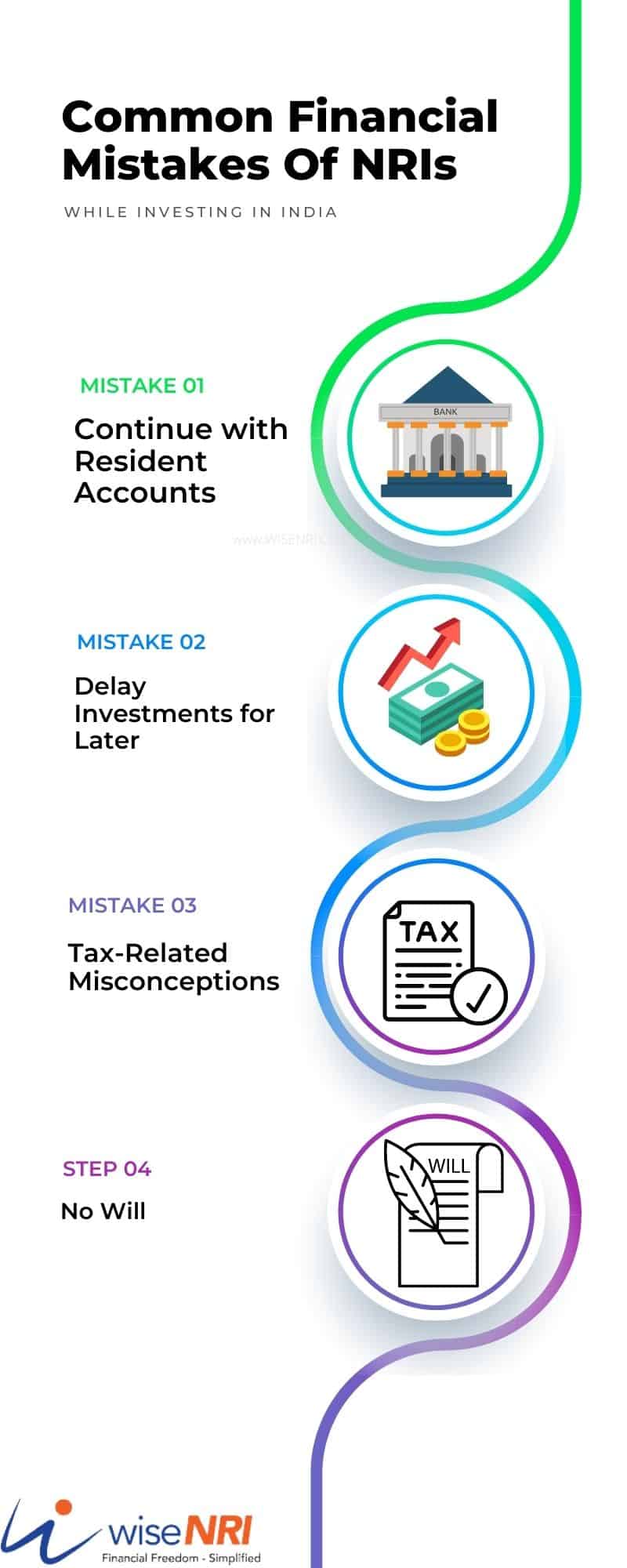There are many things in an NRI’s mind when he/she moves abroad. The mind is busy with thoughts such as –
- Will I adjust to the new country and culture?
- Will my family be happy here?
- How my new job/assignment/project will be in this new phase of life?
- Is the move to the new country worth the money that I will make?
This can lead to financial negligence which can prove to be costly in terms of missed investment opportunities, issues with the Income Tax department, and improper financial planning.

TOP Common Financial Mistakes of NRI While Investing in India
Here are some typical Financial mistakes that NRIs make and how to avoid them or fix them –
Must-Read –Financial Planner in India
1) Continue with Resident Accounts
There is a lot of work related to settling in a new place. Amidst this, NRIs might forget about their accounts with the bank in India. They may have savings bank accounts, Demat accounts, FDs, etc. It is a common Financial mistake of NRI to neglect these.
All Non-Resident Indians (NRIs) must convert their existing resident bank accounts into non-resident accounts. There are three types of accounts for NRIs to operate – NRE, NRO, and FCNR accounts.
An NRO account can be a current, savings, or term deposit account. Interest earned in the account is taxable in India. It can be held jointly with an Indian resident.
AN NRE account can be a savings, current, or term deposit account. Interest earned on NRE accounts is tax-free in India. It can be jointly held with an NRI.
Read: Can NRI Continue With Resident Savings Account In India?
Read more about them here.
An FCNR account is a term deposit account. The interest and principal are tax-free in India.
An NRI cannot operate the resident Demat account or trading account. NRIs need to open a Portfolio Investment Scheme (PIS). It is an account that can be used by NRIs to buy and sell shares, debentures, and bonds. It can be used to apply for IPOs too.
“Even if the amount we save and invest is small, the power of compounding and the long duration of investment will lead to a sizeable corpus. The more the delay in investments, the lesser wealth we will create.” wiseNRI

Must Check- 5 Financial Planning Moves for NRIs in 40s
2) Delay Investments for Later
Many NRIs feel it is problematic to invest in India when one is abroad. They think they will invest when they are back in India. Some NRIs feel they cannot burden their loved ones to manage their NRIs’ investment-related work.
Others feel they have just started to earn and their earnings can only cover their expenses. Expenses will always be there and it is in our hands to manage them well. We have to carve out a portion of our income for savings and investment at whatever stage of life we may be in.
Even if the amount we save and invest is small, the power of compounding and the long duration of investment will lead to a sizeable corpus. The more the delay in investments, the lesser wealth we will create. The NRI could also miss out on lucrative investment opportunities.
Moreover, it is not difficult to invest in India from abroad. NRIs can open PIS accounts to invest in equity and mutual funds. NRIs can invest in real estate as well.
Check – Best investment Options for NRIs in India
3) Tax-Related Misconceptions
Let us face it! Tax rules are not so simple. Moreover, from time to time, there are changes brought in too. NRIs cannot ignore taxation in India. Some feel that they do not earn regular income in India and so they need not file taxes. Some are unaware that taxes can be filed online. NRIs who do not comply with taxation rules can face court trial and penalty charges.
Here are some points to remember –
- An NRI who earns income in India in the form of rent, interest income, etc. is liable to tax. NRIs have to file a tax return if their income exceeds ₹ 2,50,000.
- Capital gains earned in India are liable to tax. Capital gains can be adjusted against capital loss subject to certain conditions.
- TDS applies to income earned by NRI. For example, if an NRI leases home property for rent, the tenant has to deduct TDS at 30% (31.2% including cess) on rent paid to NRI.
- TDS on the interest on bank deposits is 30%. Check detailed post on NRI TDS

Must Read – Best magazines for finance
4) No Will
Over a period of some years, an NRI would have created assets in different countries. If there is no record of the same, there can be issues. Moreover, in case of untoward incidents, such as NRI’s death, inheritors might not even be aware of all assets. There will be problems in the distribution of assets too.
It is better to create a Will to avoid these scenarios. Creating a Will has many advantages –
- It will be a database of all assets across different countries.
- The NRI will have a fair idea of the value of all assets.
- The inheritance will be simple and clean. Unnecessary fights and arguments can be avoided.
In India, it is not mandatory to register the Will. The Will made in India can be applicable for assets across the world. The NRI should note the local rules regarding assets in other countries and follow them to make the Will. It is possible to make multiple Wills for different assets in different countries if needed.
It is not difficult to avoid the NRI financial mistakes mentioned above. All it requires is careful financial planning, financial awareness, and some self-discipline. Taking care of the financial aspects, will lead to better wealth creation and possibly reduced tax liability.
Financial matters are complex, more so if you are an NRI. But managing them is not impossible.
Let’s work on your Financial Plan
I know this list is not comprehensive so I will request you to add a few more common Financial mistakes by NRIs in the comment section that people should be aware of.

Hi Hemant ji, I have been NRI for several years and have been investigating like resident in bank FDs and mutual funds and property out of lack knowledge and ignorance about the prohibitions and restrictions. After reading these blogs on your website I genuinely want to set the things right. How can I do that without getting involved in any legal implications?
Hi NP Joshi
According to me you should immediately start with the process of converting your FDs and your investments to avoid any problems that might occur in the future.
My daughter is presently NRI,but I had to close all her FD account as she advised that heft tax at USA .But only having two savings account of small amount of Rs.2000/ each bank.
On reading your article I have closed those two s/a , though total interest income considering both the account shall be roughly Rs.,200 only and taxation per year is beyond 2.5 lakh .
Hope I did the right thing.
Dear Susanta Ji,
I am not sure about tax but peace of mind is also important 🙂
I opened an NRO Deposit by mistake. How to fix it ?
Hi Taru,
If you don’t want to continue NRO FD – just inform your banker & they will give you premature withdrawal.
How long NRI who returns to India permanently after staying 12 years abroad can retain the NRE FD account? RNOR can retain the NRE FD account, if yes then how long. When should NRI on return permanently to India change the NRO account to the resident account?
Can joint holder of immovable and moveable Property make one will or not
Hello J C mittal,
No, it’s not possible for you to make one will